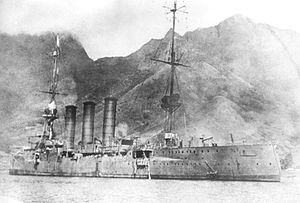Battle of Más a Tierra
| Battle of Más a Tierra | |||||||
|---|---|---|---|---|---|---|---|
| Part of the First World War | |||||||
 SMS Dresden shortly before sinking at Cumberland Bay. |
|||||||
|
|||||||
| Belligerents | |||||||
|
|
|
||||||
| Commanders and leaders | |||||||
|
|
|
||||||
| Strength | |||||||
| 2 light cruisers 1 auxiliary cruiser |
1 light cruiser | ||||||
| Casualties and losses | |||||||
| none | 4 killed 14 wounded 315 interned 1 light cruiser sunk |
||||||
The Battle of Más a Tierra was a First World War sea battle fought on 14 March 1915, near the Chilean island of Más a Tierra, between a British squadron and a German light cruiser. The battle saw the last remnant of the German East Asia Squadron destroyed, when SMS Dresden was cornered and sunk in Cumberland Bay.
After escaping from the Battle of the Falkland Islands, SMS Dresden and several auxiliaries retreated into the Pacific Ocean in an attempt to resume commerce raiding operations against Allied shipping. These operations did little to stop shipping in the area, but still proved troublesome to the British, who had to expend resources to counter the cruiser. On 8 March, his ship low on supplies and in need of repairs, the captain of the Dresden decided to hide his vessel and attempt to coal in Cumberland Bay near the neutral island of Más a Tierra. By coaling in a neutral port rather than at sea, Dresden's Captain Lüdecke gained the advantage of being able to intern the ship if it was discovered by enemy vessels.
British naval forces had been actively searching for the German cruiser and had intercepted coded wireless messages between German ships. Although they possessed copies of captured German code books, these also required a "key" which was changed from time to time. However, Charles Stewart, the signals officer, managed to decode a message from Dresden for a collier to meet her at Juan Fernandez on 9 March. A squadron made up of the cruisers HMS Kent and Glasgow along with the auxiliary cruiser Orama found the Dresden in the harbour because its sailors had joined a football match on the shore. The British ships cornered the Dresden in the bay on 14 March, challenging it to battle.
...
Wikipedia
